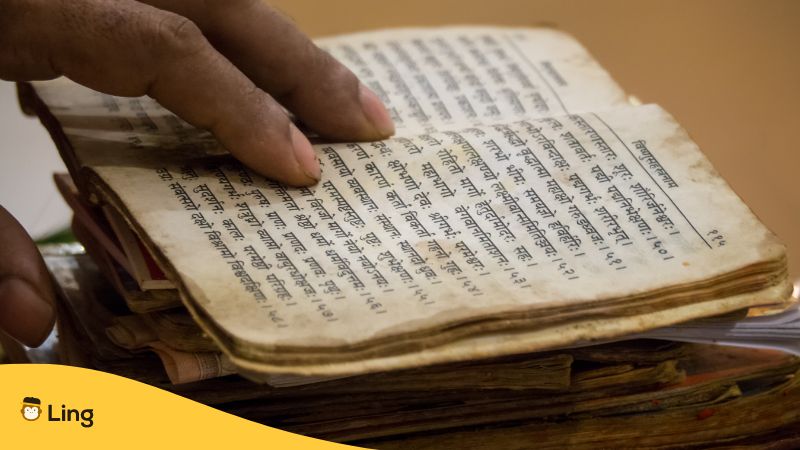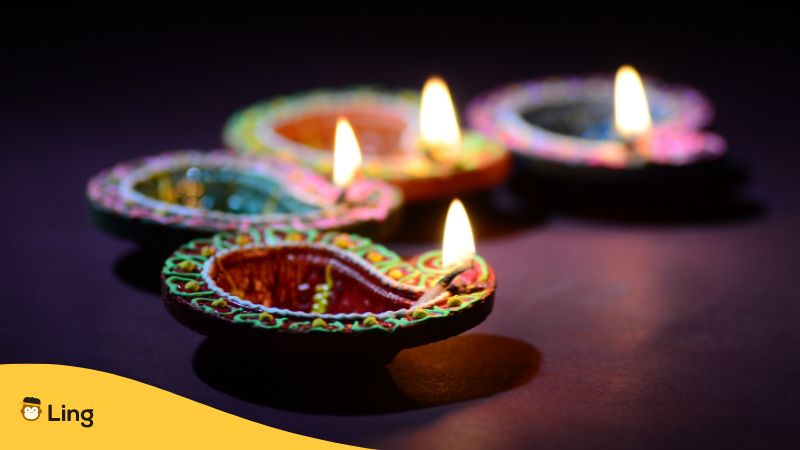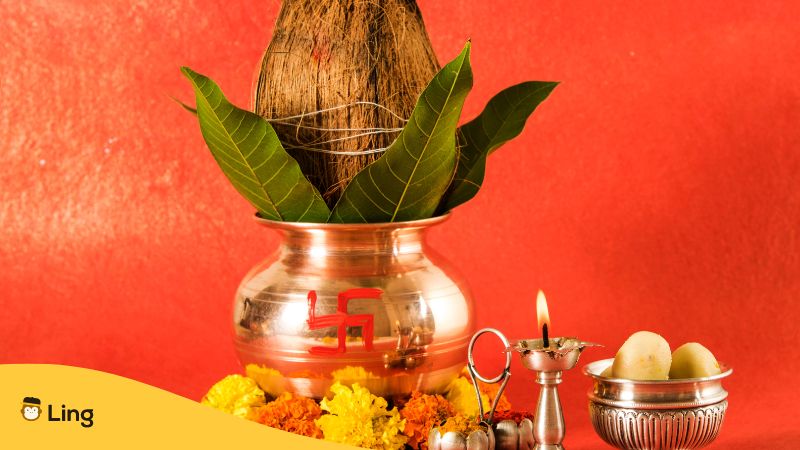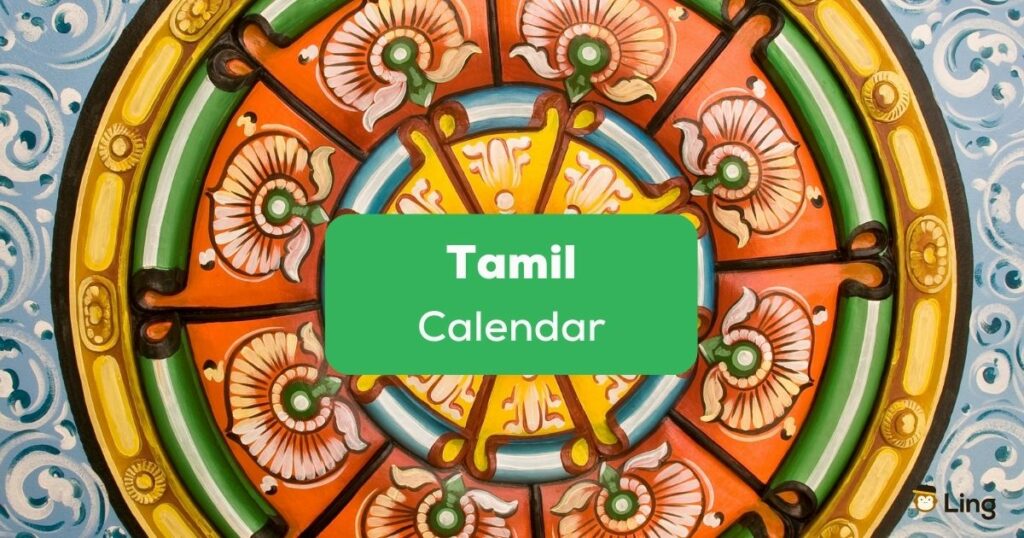Let me tell you a story about my old Tamil neighbors. Every few weeks, without fail, they would knock on my door with a smile on their face and a dish in their hands. I always knew that this meant that it was time for another festive occasion on their Tamil calendar (Tamiḻ nāṭkāṭṭi or தமிழ் நாட்காட்டி). As for me, I was more than happy to partake in their delicious offerings!
Their generosity always struck me, and it got me curious about their traditions and customs. That’s when I learned about the Tamil calendar, which is based on the Panchang (Pañcāṅkam – பஞ்சாங்கம்), a classical Hindu solar calendar used in several regions across India. Learning about it could be a beneficial language-learning experience for you too. Let’s go over that and more in today’s post!
What Is A Tamil Calendar?
For those who are not familiar with the Panchang, it is essentially a tool used to calculate the positions of the sun (Cūriyaṉ – சூரியன்), moon (Nilā – நிலா), and planets (Kirakaṅkaḷ – கிரகங்கள்) in the sky. It’s a sophisticated system that is used to mark important dates and times, including religious holidays, auspicious occasions, wedding days, and even farming seasons.
As I delved deeper into the Tamil calendar, I realized what great significance and faith it holds amidst the Tamil community. This daily calendar is not just a tool for marking dates, but it’s also deeply intertwined with Tamilian culture and tradition. It’s a way of life, a way of connecting with their past and present.
Despite technological advances and the modern world, many Hindus still follow the Panchang to mark important occasions and events. Apart from Tamil Nadu in South India, this daily calendar is also used in various states of India, like Assam, West Bengal, Kerala, Manipur, Nepal, Odisha, Rajasthan, and Punjab. Beyond Indian borders, it is followed by the Tamilians in Sri Lanka, Malaysia, and Singapore too.

How Does The Tamil Calendar Work?
The Tamil calendar follows a 60-year cycle that is also very ancient and is observed by most traditional calendars of India and China. This is related to 5 12-year revolutions of Jupiter around the Sun and one that adds up to 60 years and the orbit of stars which are called Nakshatras or Naṭcattiraṅkaḷ (நட்சத்திரங்கள்).
The calendar consists of twelve months, and each month is divided into two parts, known as Paksham. It begins with the month of Chittirai (சித்திரை), which usually falls in mid-April, and ends with Panguni (பங்குனி), somewhere in mid-March. The calendar is used not only to mark important days and events but also to follow religious traditions.
Days Of The Week In Tamil
Want to impress native speakers? Here are the basic terminologies related to the days of the week in Tamil.
Months In Tamil
It’s not enough that you know the terms for days, right? Let’s expand your knowledge further by taking note of the translations for the months in Tamil below.

Seasons In Tamil
Planning your travel? Here are the Tamil terms you need to know if you want to visit during a specific season.
| English | Tamil | Pronunciation | Sound |
|---|---|---|---|
| Spring | இளவேனில் | Ila-venil | |
| Summer | முதுவேனில் | Mudhu-venil | |
| Monsoon | கார் | Kār | |
| Autumn | குளிர் | Kulir | |
| Winter | முன்பனி | Mun-pani | |
| Prevernal | பின்பனி | Pin-pani |
Important Dates To Remember
Some of the most important occasions marked by the Tamil calendar include:
Pongal
Poṅkal (பொங்கல்) is the most important festival celebrated in Tamil Nadu and marks the start of the Tamil month. It is a four-day festival that honors the sun god with great fervor.
Tamil New Year
Also known as Puthandu (Putiya āṇṭu – புதிய ஆண்டு), the Tamil New Year falls on the first day of the Tamil month of Chittirai, which usually falls in mid-April. It is marked with feasts, special prayers, and performances.

Deepavali/ Deepawali/ Diwali
Also known as the Festival of Lights, Tīpāvaḷi (தீபாவளி) is a major Hindu religious festival. This five-day festival is celebrated in Oct-Nov and marks the triumph of good over evil with a display of fireworks, lighting lamps, and special prayers.
Thaipusam
Taippūcam (தைப்பூசம்) is a Hindu festival that honors Lord Murugan (Murukaṉ – முருகன்), the son of Lord Shiva (Civaperumāṉ – சிவபெருமான்) and is marked in the month somewhere around January or February.
Navaratri
Navarāttiri (நவராத்திரி) is a nine-day festival that honors the goddess Durga (Turkā tēvi – துர்கா தேவி). It is celebrated twice a year and is marked by fasting, prayer, and the worship of the goddess.

Important Tamil Holidays
| Tamil Holiday | Date | Purpose |
|---|---|---|
| Thiruvalluvar Day | January 15 | Celebrates Tamil poet Thiruvalluvar’s wisdom |
| Uzhavar Thirunal | January 16 | Acknowledges farmers’ hard work |
| Republic Day | January 26 | Patriotic celebration with parades |
| Telugu New Year’s Day | March 22 | Celebrates Telugu New Year (Ugadi) |
| Mahavir Jayanti | April 4 | Birth anniversary of Lord Mahavir |
| Good Friday | April 7 | Christian holiday observed worldwide |
| Dr. Ambedkar Jayanti | April 14 | Birth anniversary of Dr. B. R. Ambedkar |
| Tamil New Year | April 14 | Celebrates the Tamil New Year (Kanni tradition) |
| Idul Fitr | April 22 | Marks the end of Ramadan and start of Idul Fitr |
| May Day | May 1 | Honors labor movement and workers’ rights |
| Bakrid/Eid al Adha | June 29 | Muslim holiday of sacrifice |
| Muharram | July 29 | Commemorated with processions (Taziyas) |
| Independence Day | August 15 | Celebrates India’s independence |
| Janmashtami | September 7 | Birth of Lord Krishna |
| Ganesh Chaturthi | September 19 | Start of the ten-day Ganesh Chaturthi festival |
| Eid e Milad | September 28 | Birth anniversary of Prophet Muhammad |
| Gandhi Jayanti | October 2 | Honors Mahatma Gandhi and Tamil Nadu’s role |
| Maha Navami | October 23 | Worship of Goddess Durga |
| Vijaya Dashami | October 24 | Celebrates Vijaya Dashami (Dussehra) |
| Deepavali | November 12 | Festival of Lights (Diwali) |
| Christmas Day | December 25 | Celebrates Christmas in Christian tradition |
Wrapping Up
The Tamil calendar plays a crucial role in preserving the cultural and traditional values of the Tamil people. It serves as a means of commemorating significant events and maintaining a deep connection with their rich history and heritage. Beyond its practical function, the Tamil calendar is a testament to the vibrant and lively culture of the Tamil community.
I am grateful for having learned about this valuable cultural artifact, and it fills me with a sense of pride to be a part of a society that celebrates its past so vibrantly. The next time I am invited to enjoy the hospitality of my Tamil neighbors, I will relish every bite of their delicious food, mindful of its cultural significance.
Have Fun Learning Tamil With Ling!
Did you enjoy learning about the Tamil calendar and all the related vocabulary? There is so much more to Tamil that you can discover and learn quickly on the Ling app. Not only do we have specially curated articles on culture, tradition, food, and current trends for you to check out daily, but our expert team of writers and native speakers developed some seriously cool features for you to indulge in some linguistic acrobatics.
From informative blogs on the latest language trends to interactive linguistic games that’ll have you hooked, we’ve got you covered. The best part? By using it for 10 minutes a day, you are bound to make quick progress in any of the 60+ languages featured in it without paying an exorbitant price. There, go and satisfy the inner language lover in you! Visit Google Play Store or Apple App Store and download the Ling app for free!




































































